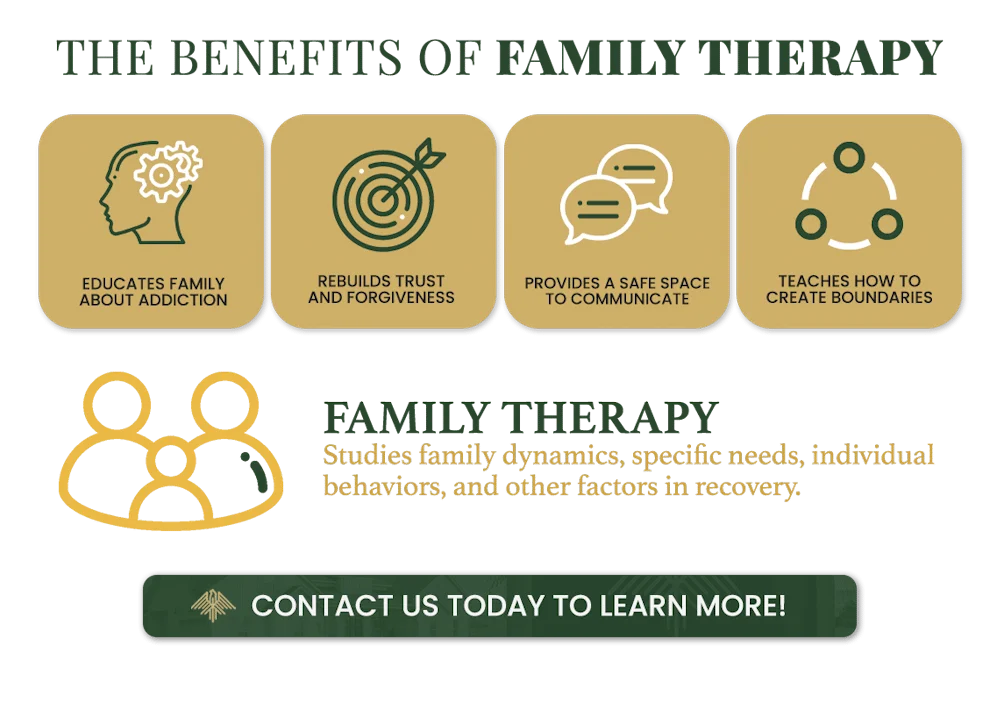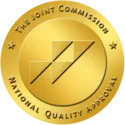Family Therapy for Addiction Treatment
Addiction affects the entire family, not just the afflicted individual. In addressing healing on every level, therapists use various family therapy techniques to heal the person’s family unit and identify problems within the inner dynamic.
Family members can benefit greatly from family therapy, even if they’re not the addict. Children of addicted people may find it easier to express their thoughts about the person’s addiction in the neutral space of family counseling. If someone is the spouse or parent of an addict, family therapy can be essential for establishing trust and support to support healing.
By re-establishing the connection between oneself and their family, it’s possible for a person suffering from addiction to repair damage that their addiction may have caused over time. They may even emerge from addiction treatment with a stronger and more comprehensive support system than before.
Family therapy often involves the people who live with the person who struggles with addiction. Also, it involves other people who are important parts of the individual’s life. Trained therapists lead sessions and often use cognitive-behavioral therapy (CBT) techniques to help facilitate communication.
Strategic family therapy can help further the healing cycle and can even set up the family of an addict to be closer after completion of the treatment program. Some approaches are solution focused, helping families set goals and work toward positive change. Families may learn more about their thoughts, responses to situations, and other helpful insights. Therapists may teach strategies to change problematic behaviors, manage distress, and manage emotions with dialectical behavior therapy (DBT).
Family therapy can emphasize goal setting and actionable steps for positive outcomes. Families learn about addiction and how it works to help them better understand how to support a loved one. Additionally, family addiction counseling can help people who struggle with addiction see how it affects those closest to them.
How Does Family Therapy Work?

Modern family therapy involves studying family dynamics and specific needs within the family system. Individual behavior, responses, and engagement in surrounding systems vary based on several factors. Therapists try to learn the broad context of those factors to better understand each person.
In many cases, families do not realize certain hindrances within their dynamic that can lead to other problems. Family members may not realize how their family issues impact their relationships with peers, colleagues, and others outside the family unit. Therapists set goals with families based on key therapy guidelines, which family therapy sessions and individual needs can also inform. Therapists also help families develop problem-solving skills to address challenges related to addiction. Positive reinforcement may be used to encourage healthy behaviors. If the family is more peaceful than before, this stronger support system may make all the difference.
Contact Eagle Creek Ranch
Recovery Today!
Why Wait? Find The Help You Need By Reaching Out To Us Today! Our Admissions Team Is Standing By.
The Goals of Family Therapy for Substance Abuse

There are unique challenges addiction presents for families. For example, the needs of a family going through a divorce are different from the needs of one trying to help an addicted loved one. However, there are many different potential family structures and needs. As a result, family therapy in addiction treatment must take all those factors into account.
In functional family therapy, there are usually several core goals set by the therapist. These may include:
- Using a collaborative and non-blaming approach instead of a confrontational one.
- Helping families develop strategies to manage chronic mental health needs, and to communicate in a way that takes this into account.
- Emphasizing the value of family involvement by including all family members.
- Broadening the success measures for one person’s individual treatment to include the entire family’s well-being.
- Establishing harm-reducing goals that can benefit the family, both physically and psychologically.
- Taking into account the cultural practices of families within their communities and using them to reframe goals for addiction treatment (as well as the potential unification of the family).
- Recognizing the importance of families’ other networks or communities as support and reinforcement sources.
- Developing healthy parenting skills, especially for families with adolescents affected by addiction.
In addition to using the above guidelines, therapists work with families to hear and consider their specific goals. Therapy may involve every member of an immediate family to address the collective impact of addiction.
The Benefits of Family Therapy for Addiction

Working toward goals as a family can have positive long-term outcomes that last beyond addiction. Significantly contributing to the recovery process, family therapy can enhance communication and strengthen relationships.
These are some top benefits of family therapy for the treatment of addiction:
- Learning what addiction treatment is and knowing what to expect during initial drug and alcohol detoxification.
- Understanding addiction as a disease and how it influences a person’s behavior.
- Learning productive and valuable ways to communicate better.
- Knowing how to create boundaries and how to tell the difference between providing support and enabling the addicted person.
- Developing skills to protect individual mental well-being.
- Learning how to identify, correct, and prevent codependent behaviors.
- Rebuilding trust and learning how to forgive.
- Having a safe space to share feelings, concerns, and struggles.
- Creating an effective, nurturing support system for an addicted loved one.
- Understanding triggers and how to help a loved one prevent relapse.
- Learning self-assessment techniques to understand individual needs and family relationships.
Community resources such as peer support groups, housing assistance, education, and job placement services can also play a crucial role in supporting recovery and helping families maintain progress after therapy. Family therapy can further help individuals maintain abstinence by strengthening family support systems and reinforcing positive behaviors that support long-term sobriety.
One benefit of family therapy for some families is discovering unmet mental health needs. This may be true for the individual with an addiction or their family members. A co-occurring mental health disorder often causes a person to seek substances for relief or to self-medicate. But this can often spiral into addiction and eventually needing treatment for both mental illness and substance abuse. Family therapy can help identify and address mental health problems that may contribute to substance use, ensuring that co-occurring issues are properly managed as part of recovery from addiction.
Who is a Candidate for Family Therapy?

Today, families are much more than immediate family members. Some people may not know their birth families or may live in blended families. The structure and treatment process of family therapy can be applied to many forms of intimate groups.
These are some examples of people who may be close to a loved one struggling with addiction:
- Chosen family members
- In-laws
- Stepchildren
- Stepparents
- Foster family members
- Extended family members
- Fellow veterans
- Mentors
- Colleagues
With permission from the therapist and institution (if relevant), different members of an individual’s support system can participate in family therapy. It will still be conducted differently than group therapy, which frequently features people who do not know each other and are united solely by their shared addiction or treatment needs.
Family therapy can also motivate individuals with addiction to seek treatment by involving their support network.
What if Family Members will not Participate in Therapy?
In some families, there may be strained relationships. Not everyone may be willing to participate in therapy meant to restore or repair the family dynamic. Other family members and the person with the addiction should not take this personally. Family members who are unwilling to participate may be fearful of change, skeptical of the effectiveness of therapy, or have other concerns. Therapists begin facilitating and initiating work with the family members who are willing to participate. Others may simply need time, and can join in sessions when they are ready.
Finding the Right Family Therapist
In comparison with treatment that lacks family therapy, programs that include it are usually much more effective. Because of the complexities of addiction, choose a family therapist who focuses on addiction or has experience with it. If a loved one is going through treatment at a facility, that facility may offer it.
Finding the right therapist can vary based on location, insurance, and more. For example, someone who has insurance may search a database of covered providers. A person who lives in a specific area may search for nearby therapists. Professional treatment facilities like Eagle Creek Ranch Recovery are often the first place to look, and many facilities can answer questions about insurance.
Receive Help for Addiction at Eagle Creek Ranch Recovery
Family therapy is one of the addiction treatment services Eagle Creek Ranch Recovery offers in our Nampa, Idaho facility within driving distance of Boise. We also provide individual therapy, dual diagnosis treatment, and other services to support recovery.
If you have a loved one who is struggling with addiction, we can help. Our goal is to help men with addiction learn how to achieve sobriety and stay in recovery. To learn more about addiction and the role of family therapy, please contact us.

Clinical Director
Kendall Maloof is the clinical director at Eagle Creek Ranch Recovery. She is a licensed marriage and family therapist and has held multiple leadership roles before settling here at Eagle Creek Ranch Recovery. Kendall received her master’s degree in marriage and family therapy from the Chicago School of Professional Psychology in 2016. Her career in mental and behavioral health began in 2014 when she took up internships in both the nonprofit and for profit sectors. She interned at multiple reputable companies, such as The Living Success Center and 449 Recovery in California.
In 2019, Kendall became the clinical director of Sunsets Recovery for Woman, a dual diagnosis program in southern California. Kendall is a natural leader. She has an incredible ability to problem solve and stay calm in any situation. Kendall never fails to show up when she is needed, and her calm demeanor makes her team and clients feel at ease. Eagle Creek Ranch Recovery is proud to have Kendall as our clinical director.


